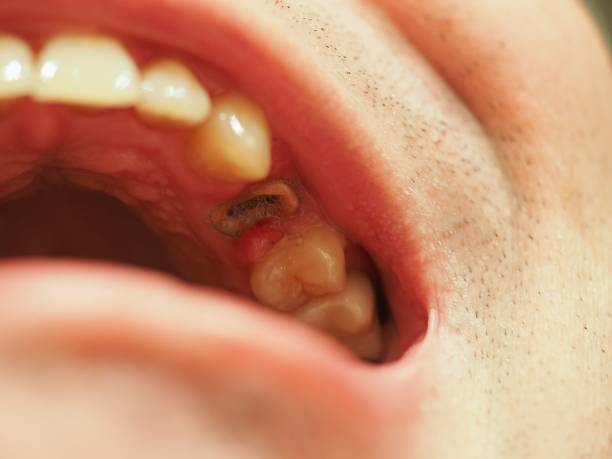Appointment


Tooth roots are the foundation of dental anatomy. They are vital for structural support and overall health. When exposed, they can lead to a host of issues, ranging from sensitivity to serious infections.
In this comprehensive guide from Al Care Dental, we'll explore what it means to have tooth roots exposed, how to recognize the symptoms, the causes behind this condition, and effective treatment options. We’ll also provide tips for preventing this problem and maintaining optimal oral hygiene.
To truly understand the implications of exposed tooth roots, we need to start with the basics: what are tooth roots, and why are they so crucial to our dental health?
Tooth roots are located below the gum line, anchoring each tooth securely in place within the jawbone. They are vital for stabilizing teeth and facilitating the transfer of nutrients from the jawbone to the tooth.
The enamel and cementum serve as protective barriers for the tooth roots. Enamel covers the crown of the tooth, while cementum shields the roots. When these protective layers are compromised, the roots become vulnerable to external stimuli and potential damage.
Identifying exposed tooth roots early can prevent more severe complications. Here’s how you can recognize this condition:
Look for signs such as visible yellowish dentin near the gum line, longer-looking teeth, and noticeable gaps between the gums and teeth.
Several symptoms can indicate that your tooth roots are exposed:
Sensitivity to hot, cold, sweet, or acidic foods and beverages is a common indicator of exposed roots. This occurs because the dentin layer, which contains tiny tubules leading to the tooth’s nerve, is no longer protected.
Discomfort or extreme tooth pain while chewing can signal exposed roots, as the protective layers are no longer buffering the pressure exerted on the teeth. This sensitivity can significantly affect eating habits and overall quality of life.
Noticeable gum recession exposes more of your tooth root. This means the gum tissue that normally surrounds your teeth has shrunk back.
Understanding what leads to exposed tooth roots can help in both prevention and treatment. Several factors can contribute to this dental issue:
Periodontitis, a severe gum infection, is a major cause of gum recession and exposed roots. If left untreated, this condition can destroy the bone-supporting teeth, ultimately resulting in tooth loss.
Plaque buildup hardens into tartar, which harbors bacteria that cause inflammation and recession of the gums, eventually leading to exposed roots. The longer plaque and tartar remain on your teeth, the more damage they can do to the gums and underlying bone.
Brushing your teeth too hard or using a hard-bristled toothbrush can wear down the enamel and cause gum recession, exposing the roots. This aggressive technique not only damages the gums but also increases tooth sensitivity and the risk of cavities.
Our bodies undergo hormonal shifts throughout life, especially during pregnancy, menopause, and puberty. These changes can make gums more sensitive and vulnerable to receding, which can expose tooth roots.
Several other factors can contribute to exposed tooth roots:
If left untreated, exposed tooth roots can lead to several serious dental issues:
Timely diagnosis and appropriate treatment are crucial for managing exposed tooth roots effectively.
Prevention is always better than cure. Here’s how you can prevent exposed tooth roots:
Use a soft-bristled toothbrush and gentle brushing techniques. Floss daily to remove plaque from areas your toothbrush can’t reach. Replace your toothbrush every three to four months or sooner if the bristles are frayed.
Visit your dentist regularly for checkups and professional cleanings to maintain optimal oral health. Early detection of dental issues can prevent more serious problems and ensure your gums remain healthy.
A well-rounded diet abundant in vitamins and minerals promotes strong gums and teeth. Minimize the intake of sugary and acidic foods and beverages. Incorporate plenty of fruits, vegetables, and dairy products to support overall dental health.
Certain lifestyle choices can have a significant impact on your gum health:
High stress can lead to habits like teeth grinding and clenching, which contribute to gum recession and exposed roots. Practice stress management techniques such as meditation and exercise to help fix teeth grinding.
Using tobacco products, including smoking, can cause gum disease and gum recession. By stopping these habits, you can greatly enhance your oral health.
At Al Care Dental, we are committed to providing exceptional dental care for the whole family. Our motto, "Dentistry from the Heart," reflects our dedication to treating every patient like family.
If you’re experiencing issues with exposed tooth roots or any other dental concern, our experienced team is here to help. We offer a range of dental services, from preventative care to advanced treatments, ensuring you receive the best care possible.
Plus, new or existing patients receive a free electric toothbrush after a cleaning, exam, and X-ray. Call now to schedule your next appointment and take the first step towards a healthier smile.

Early detection and treatment of exposed tooth roots are vital for maintaining a healthy smile. By practicing good oral hygiene, making informed lifestyle choices, and seeking regular dental care, you can prevent this condition and enjoy a lifetime of dental health.
Remember, your smile is worth the effort—prioritize your oral health today.
We’re glad you chose our practice! Please take some time to learn about how to prepare for your first appointment.
Find Out more